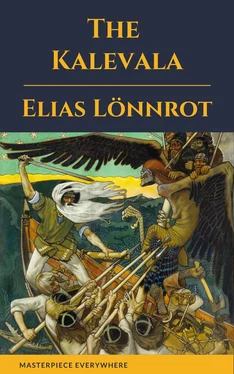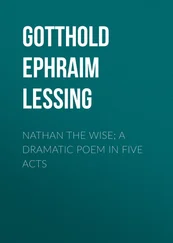On his back to rock forever,
Thus the boundless sea to travel,
Thus to ride the rolling billows."
This the answer of the mother:
"Woe to earth for this thine action,
Gone forever, joy and singing,
Vanished is the wit of ages!
Thou hast slain good Wainamoinen.
Slain the ancient wisdom-singer,
Slain the pride of Suwantala,
Slain the hero of Wainola,
Slain the joy of Kalevala."
Rune VII. Wainamoinen's Rescue.
WAINAMOINEN, old and truthful,
Swam through all the deep-sea waters,
Floating like a branch of aspen,
Like a withered twig of willow;
Swam six days in summer weather,
Swam six nights in golden moonlight;
Still before him rose the billows,
And behind him sky and ocean.
Two days more he swam undaunted,
Two long nights be struggled onward.
On the evening of the eighth day,
Wainamoinen grew disheartened,
Felt a very great discomfort,
For his feet had lost their toe-nails,
And his fingers dead and dying.
Wainamoinen, ancient minstrel,
Sad and weary, spake as follows:
"Woe is me, my old life fated!
Woe is me, misfortune's offspring!
Fool was I when fortune, favored,
To forsake my home and kindred,
For a maiden fair and lovely,
Here beneath the starry heavens,
In this cruel waste of waters,
Days and nights to swim and wander,
Here to struggle with the storm-winds,
To be tossed by heaving billows,
In this broad sea's great expanses,
In this ocean vast and boundless.
"Cold my life and sad and dreary,
Painful too for me to linger
Evermore within these waters,
Thus to struggle for existence!
Cannot know how I can prosper,
How to find me food and shelter,
In these cold and lifeless waters,
In these days of dire misfortune.
Build I in the winds my dwelling?
It will find no sure foundation.
Build my home upon the billows?
Surely would the waves destroy it."
Comes a bird from far Pohyola,
From the occident, an eagle,
Is not classed among the largest,
Nor belongs he to the smallest;
One wing touches on the waters,
While the other sweeps the heavens;
O'er the waves he wings his body,
Strikes his beak upon the sea-cliffs,
Flies about, then safely perches,
Looks before him, looks behind him,
There beholds brave Wainamoinen,
On the blue-back of the ocean,
And the eagle thus accosts him:
"Wherefore art thou, ancient hero,
Swimming in the deep-sea billows?
Thus the water-minstrel answered:
"I am ancient Wainamoinen,
Friend and fellow of the waters
I, the famous wisdom-singer;
Went to woo a Northland maiden,
Maiden from the dismal Darkland,
Quickly galloped on my journey,
Riding on the plain of ocean.
I arrived one morning early,
At the breaking of the day-dawn.
At the bay of Luotola,
Near Youkola's foaming river,
Where the evil Youkahainen
Slew my steed with bow and arrow,
Tried to slay me with his weapons.
On the waters fell I headlong,
Plunged beneath the salt-sea's surface,
From the saddle of the courser,
From my dappled steed of magic.
"Then arose a mighty storm-wind,
From the East and West a whirlwind,
Washed me seaward on the surges,
Seaward, seaward, further, further,
Where for many days I wandered,
Swam and rocked upon the billows,
Where as many nights I struggled,
In the dashing waves and sea-foam,
With the angry winds and waters.
"Woe is me, my life hard-fated!
Cannot solve this heavy problem,
How to live nor how to perish
In this cruel salt-sea water.
Build I in the winds my dwelling?
It will find no sure foundation.
Build my home upon the waters?
Surely will the waves destroy it.
Must I swim the sea forever,
Must I live, or must I perish?
What will happen if I perish,
If I sink below the billows,
Perish here from cold and hunger?"
Thus the bird of Ether answered
"Be not in the least disheartened,
Place thyself between my shoulders,
On my back be firmly seated,
I will lift thee from the waters,
Bear thee with my pinions upward,
Bear thee wheresoe'er thou willest.
Well do I the day remember
Where thou didst the eagle service,
When thou didst the birds a favor.
Thou didst leave the birch-tree standing,
When were cleared the Osmo-forests,
From the lands of Kalevala,
As a home for weary song-birds,
As a resting-place for eagles."
Then arises Wainamoinen,
Lifts his head above the waters,
Boldly rises from the sea-waves,
Lifts his body from the billows,
Seats himself upon the eagle,
On the eagle's feathered shoulders.
Quick aloft the huge bird bears him,
Bears the ancient Wainamoinen,
Bears him on the path of zephyrs,
Floating on the vernal breezes,
To the distant shore of Northland,
To the dismal Sariola,
Where the eagle leaves his burden,
Flies away to join his fellows.
Wainamoinen, lone and weary,
Straightway fell to bitter weeping,
Wept and moaned in heavy accents,
On the border of the blue-sea.
On a cheerless promontory,
With a hundred wounds tormented,
Made by cruel winds and waters,
With his hair and beard dishevelled
By the surging of the billows.
Three long days he wept disheartened
Wept as many nights in anguish,
Did not know what way to journey,
Could not find a woodland foot-print,
That would point him to the highway,
To his home in Kalevala,
To his much-loved home and kindred.
Northland's young and slender maiden,
With complexion fair and lovely,
With the Sun had laid a wager,
With the Sun and Moon a wager,
Which should rise before the other,
On the morning of the morrow.
And the maiden rose in beauty,
Long before the Sun had risen,
Long before the Moon bad wakened,
From their beds beneath the ocean.
Ere the cock had crowed the day-break,
Ere the Sun had broken slumber
She had sheared six gentle lambkins,
Gathered from them six white fleeces,
Hence to make the rolls for spinning,
Hence to form the threads for weaving,
Hence to make the softest raiment,
Ere the morning dawn had broken,
Ere the sleeping Sun had risen.
When this task the maid had ended,
Then she scrubbed the birchen tables,
Sweeps the ground-floor of the stable,
With a broom of leaves and branches
From the birches of the Northland,
Scrapes the sweepings well together
On a shovel made of copper,
Carries them beyond the stable,
From the doorway to the meadow,
To the meadow's distant border,
Near the surges of the great-sea,
Listens there and looks about her,
Hears a wailing from the waters,
Hears a weeping from the sea-shore,
Hears a hero-voice lamenting.
Thereupon she hastens homeward,
Hastens to her mother's dwelling,
These the words the maiden utters:
"I have heard a wail from ocean,
Heard a weeping from the sea-coast,
On the shore some one lamenting."
Louhi, hostess of Pohyola,
Ancient, toothless dame of Northland,
Hastens from her door and court-yard,
Through the meadow to the sea-shore,
Listens well for sounds of weeping,
For the wail of one in sorrow;
Hears the voice of one in trouble,
Hears a hero-cry of anguish.
Thus the ancient Louhi answers:
"This is not the wail of children,
Читать дальше












